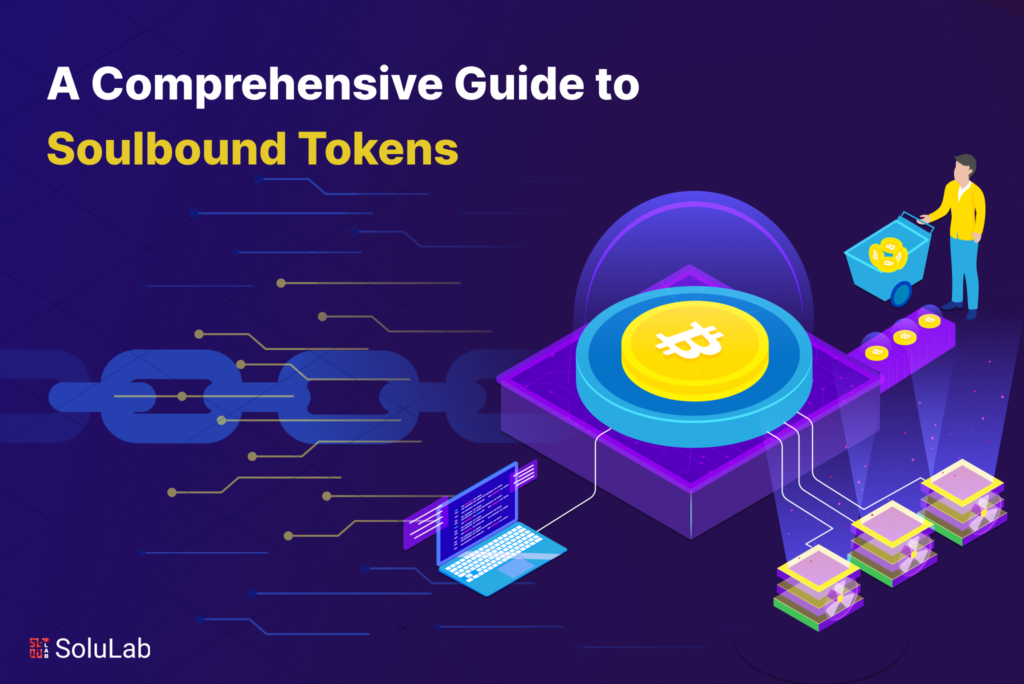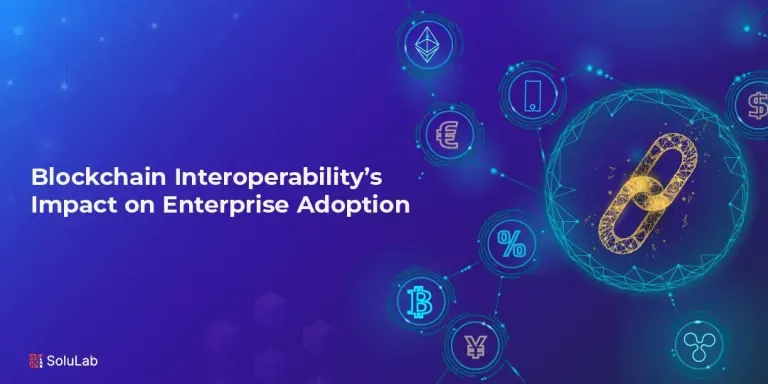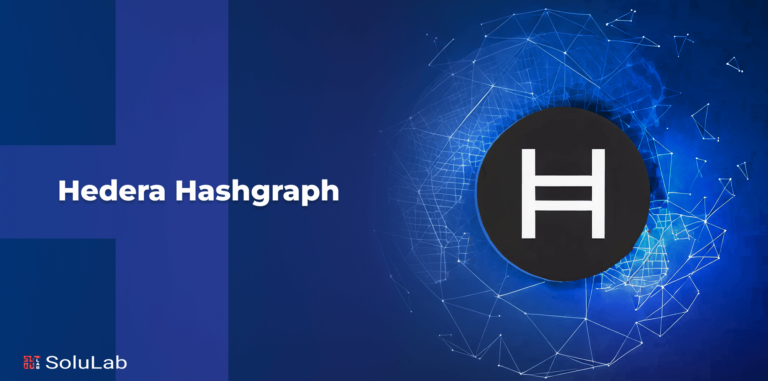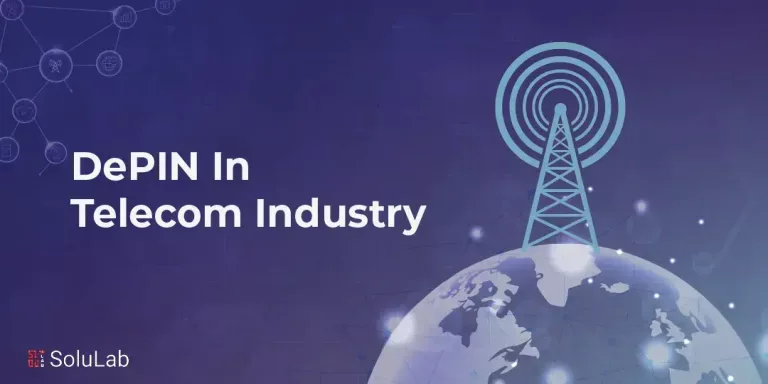The introduction of the Digital Finance System with outstanding flexibility and high-rate transparency has surprised the global economy. In the past decade, the popularity of Blockchain-based assets has steadily increased, and as a result, they have become mainstream. The unique approach to ownership grabbed the attention of none other than Vitalik Buterin, and came with a vision of making NFTs “Soulbound”. So, what is it?
Soul Bound Tokens are non-transferable digital identity tokens representing the individual’s unique identity. These tokens incorporate unique traits, characteristics, or background which may include the person’s medical history, work records, or the other type of information that solely belongs to that entity- all encapsulated within the secure confines of blockchain wallets known as “Souls.”
There are two distinct categories:
- Self-Certified SBTs: These tokens contain personal information that individuals consider relevant to share within their networks.
- Soul-Issued SBTs: In this context, “Souls” represent institutions, companies, and other individuals capable of issuing SBTs as proof of credentials, affiliations, or memberships.
Motivation Behind Soul Bound – The World Of WitchCraft
The idea of creating SoulBound tokens originated from a popular game “World Of Witchcraft”, in which once a player picks the rare “Soul Bound” items, they cannot further be sold or transferred to the other players as the items “Bounds” forever with the player’s “Soul”.
Soul Bound NFTs: Where Ownership Meets Immortality
As we see the current scenario, NFTs are created to represent the unique ownership of an asset, art, or collectibles on the blockchain network. Each NFT has a unique identification code that can not be replicated or falsified, however, can be sold or transferred.
Soul Bound Tokens aim to redefine NFTs beyond their monetary value and status symbols as unique, one-of-a-kind tokens which cannot be sold or transferred from your “Soul”, setting them apart from the Fungible and Non-Fungible Tokens.
Significance Of Soul Bound Tokens In Real World
A person can possess multiple SBTs, each representing aspects of their lives in the digital realm.
Let’s take an example of “Education” Soul, which securely stores your student credentials, degrees, and attendance records. Similarly, the “Medical Records” Soul helps you keep track of your past medical history.
When combined with Soul Bound Tokens (SBTs), these Souls enable individuals to build a trustworthy digital reputation in the Web3 ecosystem, rooted in their past actions and experiences, significantly boosting their overall credibility.
When discussing entities, Souls serve as the representatives responsible for allocating SoulBound Tokens (SBTs). In this particular context, SBTs contained within a single Soul can undergo validation or issuance by other Souls, which serve as reliable counterparts within this network. These counterpart Souls can encompass various types of entities, including businesses, individuals, or organizations.
To illustrate this concept, consider business organizations as “Souls” that issue SBTs containing work experience details to employees who have their own Souls. These work experience details are added to the employee’s “Credential” Soul, which holds information about their previous work experience and educational qualifications.
Related: Top 10 Layer 1 Blockchains in 2024
Working Of Soul Bound Token
While there are currently no formal specifications for SoulBound tokens (SBTs), Vitalik and his colleagues’ whitepaper provides valuable insights into their fundamental functioning.
One notable and distinctive feature of SBTs is their inherent non-transferability.
In contrast to commonly known tokens like non-fungible tokens (NFTs) and token standards such as fungible ERC-20 or non-fungible ERC-721, SoulBound tokens are intentionally designed to lack any market value. As a result, they are non-transferable to different wallets.
In the regrettable circumstance of a soul loss, what are the ensuing consequences? Introducing the social recovery model.
The enduring issue of safeguarding blockchain assets, such as wallets or keys, has elicited apprehension among members of the Bitcoin ecosystem. Similar to non-fungible tokens (NFTs), soul-bound tokens (SBTs) also encounter the potential threat of theft. Developers demonstrate a strong commitment to protecting user privacy and preventing harmful individuals from participating in identity theft.
In their first article titled “Social Recovery Model for Widespread Adoption in the Ethereum Community,” Vitalik Buterin and his colleagues offered an innovative approach to social recovery. Within this novel methodology, customers possess the capacity to assign particular persons or establishments as “guardians.”
During periods of ambiguity or emergency, these designated “guardians” are vested with the power to retrieve and alter the private keys linked to a user’s Soul wallet. However, it is important to recognize that the underlying presumption of this particular model is that every modification to a person’s private keys requires consent from a majority of eligible members within the corresponding community.
Here is how you can create a Soul Bound Token:
1. Proto-Soulbound NFT: One approach involves the creation of a Proto-Soulbound NFT, which can issue or invalidate SBTs for other wallets.
2. Multi-Sig Community Wallet: Another method is establishing a Multi-Sig Community wallet that can issue SBTs to community members. Additionally, it holds the authority to revoke or recover SBTs if they are lost.
3. Proto-Souls and Direct Issuance: Creating Proto-Souls or Proto-Wallets provides another avenue to directly issue SBTs to other Souls or wallets.
However, it’s important to note that once received, a Soulbound Token cannot be transferred, although it may be revocable by the issuer. Once these tokens enter your wallet, they remain bound to you indefinitely. The sole entity with the power to burn a Soulbound Token is the issuer.”
Practical Application of Soulbound Tokens
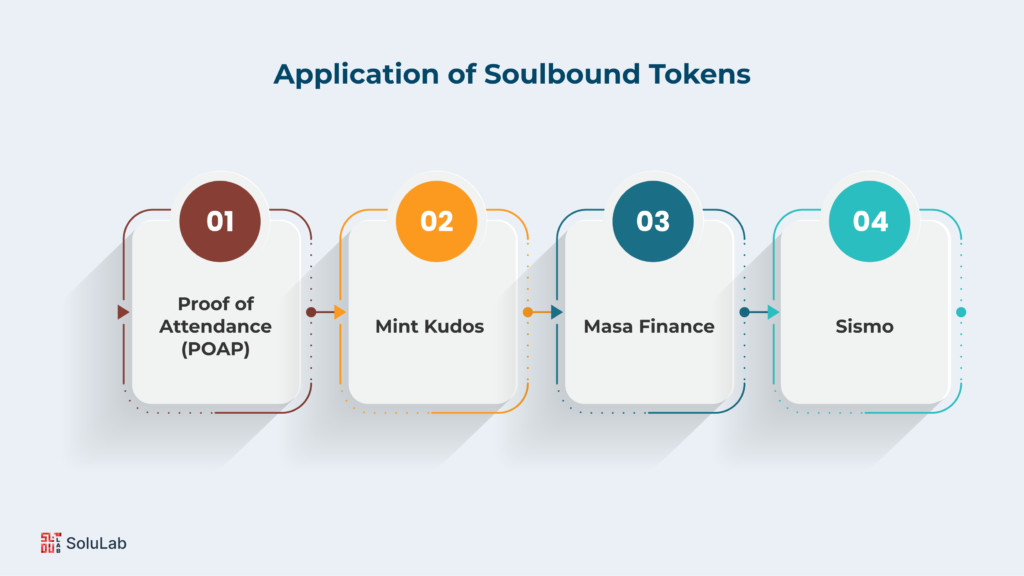
1. Proof of Attendance (POAP)
At the forefront of the Soulbound Token development landscape, Proof of Attendance (POAP) stands as a pivotal project. Technically classified as an NFT rather than an SBT, POAP takes the lead in demonstrating how tokens can empower holders to construct their identity, transcending mere trading and speculative activities. This aligns seamlessly with the overarching mission of SBT.
Notably, a section of Vitalik Buterin’s prestigious POAP collection is dedicated to this endeavor.
2. Mint Kudos
Mint Kudos emerges as a dynamic platform enabling communities to acknowledge and reward their dedicated members through the issuance of SBTs. Mint Kudos excels for several reasons:
- It offers the optimal means to express gratitude towards contributors.
- The setup process is remarkably streamlined, requiring just 10 minutes.
- Robust integrations with other notable projects such as Mazury and Alchemy enhance its functionality.
3. Masa Finance
Masa Finance leverages the capabilities of SBT to address many challenging issues in the realm of Web3: on-chain credit. This innovative web3 platform establishes a connection between users’ traditional financial accounts and crypto accounts, effectively generating a decentralized credit report in the form of SBT.
Impressively, Masa garnered an astounding 36,000 sign-ups shortly after its May launch, highlighting its significance in the blockchain space.
4. Sismo
Sismo introduces the cutting-edge ZK SBT Badge, where ZK denotes Zero-Knowledge Proofs, ensuring that no one can trace back to the source account used to validate eligibility for the Badge. Sismo’s functionality resembles that of Tornado
Use Cases of SBT
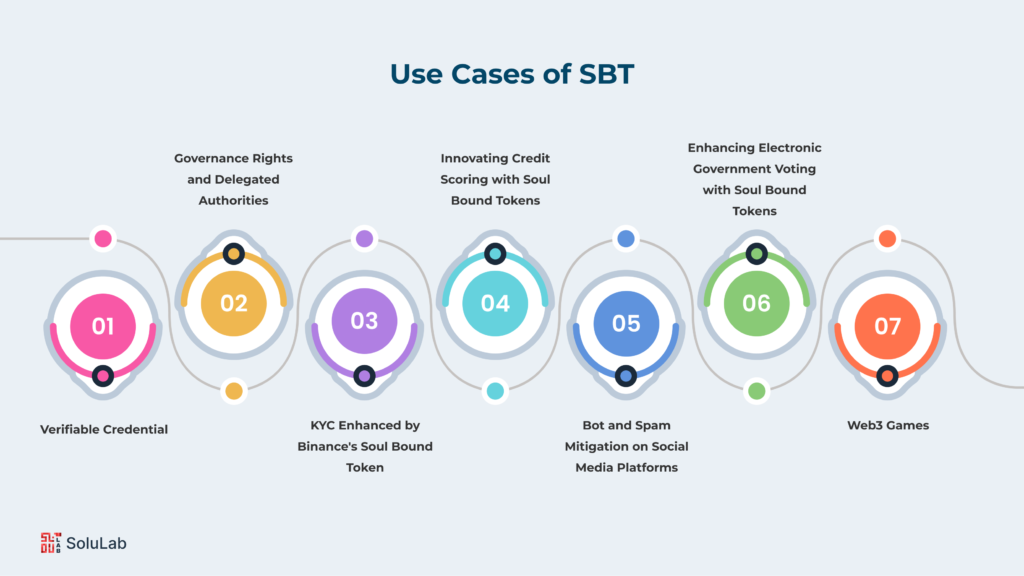
-
Verifiable Credential
Just like in the real world where society heavily relies on social signaling, the essential components for constructing a digital identity incorporate trustworthiness, social value, and reputation.
This is precisely why one of the most promising applications for SoulBound tokens lies in the realm of “verifiable credentials.” These tokens serve as a robust means of verifying an individual’s identity, attributes, expertise, and qualifications.
Although the issuance of digital credentials is not a novel concept – educational institutions routinely provide digital credentials to students to showcase their knowledge in specific fields – it can often be challenging to ascertain the authenticity of these credentials.
Consider the example of LinkedIn, where individuals can freely add multiple employers to their profiles. This open system creates opportunities for malicious actors to masquerade as members of reputable organizations, leading to a prevalence of identity scams on such platforms.
Fortunately, If the credential details are stored on the Blockchain network, the data becomes verifiable and immutable.
Moreover, the records are permanent with details about the tokens like the issuing date, or transfer details. Token provenance makes sure that the certificates are given by an authentic organization or institution, so there is no chance for fraud scams.
Therefore, the Soul-bound tokens unlock verifiable credentials allowing tokens to represent any valuable information from certificated to educational records.
-
Governance Rights and Delegated Authorities
NFTs have gained significant traction in granting governance rights and delegated authority. However, in the context of systems like DAOs, the transferability of these NFTs presents significant challenges for two primary reasons:
- The transferability of governance rights contradicts the very essence of a “decentralized” governance system. It opens the door for concentrated interests to accumulate governance rights from others, potentially undermining the system’s ability to reflect the majority consensus effectively.
- Transferability of governance rights can introduce the risk of disinterested or unqualified individuals gaining access to the system and acquiring governance rights without a genuine commitment to the community’s well-being.
To mitigate such problems, Soul Bound tokens can be used to make the governance right non-transferable or conditional on participation- with revoking capabilities in case the user loses access to their wallets or contributes to something that does not match the community interest.
Non-transferable voting rights serve to create more democratic governance structures for everything from a CityDAO with evenly distributed voting power that is tied to residence in the city, to blockchain ecosystem protocols that require active participation by DAO members.
-
Your Customer (KYC) Enhanced by Binance’s Soul Bound Token
Binance introduces the innovative Soul Bound Token (SBT) to revolutionize data privacy and security concerns associated with KYC processes. Here’s how it works:
Imagine you hold BAB tokens. These tokens empower account holders to seamlessly complete their KYC verification. Moreover, these tokens double as proof of verification stored securely in wallets, elevating security and trust levels in the world of DeFi finance while safeguarding user information.
KYC Tokens serve as formidable tools for financial institutions to combat fraudulent activities and deter bots from accessing financial services. They might even facilitate the provision of flash loans with minimal collateral requirements.
In essence, Soul Bound Tokens strike an ideal balance between user privacy and regulatory compliance. They are non-transferable, serving as digital KYC credentials.
-
Innovating Credit Scoring with Soul Bound Tokens
Decentralized finance (DeFi) champions the empowerment of individuals who lack trust in traditional institutions. Soul Bound Tokens introduce a fair scoring system:
Conventional credit scoring methods often exhibit bias against individuals with lower incomes or marginalized backgrounds, individuals without traditional credit histories. By allowing individuals to establish transparent financial transaction records through SBTs, DeFi platforms can extend uncollateralized loans to a wider demographic, reducing racial biases in credit scoring and promoting fairness.
-
Bot and Spam Mitigation on Social Media Platforms
The proliferation of automated bots on social media platforms poses significant challenges. These bots manipulate public discourse, spread misinformation, and employ deceitful strategies to extract personal information from unsuspecting users.
Soul Bound Tokens offer a solution by enabling the creation of authentic “human-only” social media platforms. Users must verify their digital identity through mechanisms like Ethereum Name Service (ENS), similar to platforms such as Lens and Farcaster, which effectively exclude bots by linking digital identities to user accounts.
Ongoing efforts are underway to develop proof-of-humanity or proof-of-personhood using SBTs. This approach promises a more reliable and open digital environment while protecting user privacy for those who prefer online anonymity.
-
Enhancing Electronic Government Voting with Soul Bound Tokens
Replacing traditional voting methods with fully electronic systems has proven challenging due to concerns about errors and potential interference. Leveraging blockchain technology, Soul Bound Tokens offer a promising solution:
Under this system, each voter receives an SBT, equating to one vote. Only those holding the specific token can cast their votes. For larger jurisdictions, voting could extend to include holders of municipality-specific SBTs within that area.
SBTs streamline the electronic voting process and offer flexibility, accommodating regional preferences with both on-chain and off-chain voting methods. On-chain voting records votes directly on the blockchain while preserving voter anonymity through zero-knowledge proofs.
-
Web3 Games
Returning to the inception of this idea, Vitalik found inspiration for non-transferrable NFTs in the web3 use cases by drawing parallels with the concept of “soulbound items” seen in popular video games such as World of Warcraft. These items are exclusively obtainable through challenging in-game tasks and cannot be acquired through monetary purchases. This very same notion can be extended to in-game items within the web3 gaming realm.
As the web3 gaming ecosystem continues to expand, an ongoing conversation revolves around the transformation of in-game items into NFTs, granting players full ownership and enabling activities like buying, selling, and trading them on open marketplaces.
However, what about items that can only be achieved through in-game accomplishments, rather than being available for purchase? This mechanic holds significant importance in many games as it fosters online social recognition based on achievements, rather than purely financial transactions.
Hence, the concept applied to the scenarios described above can also be employed for in-game items, ensuring that they remain the exclusive property of a single player, ineligible for trade, and serving as a testament to the player’s in-game skill or achievements.
For instance, projects like DeQuest, Ever Game, and X-Borg utilize NTSTs as badges and tokenized trophies for their communities and supporters.
Examples of the Futuristic Application of Soul Bound Tokens
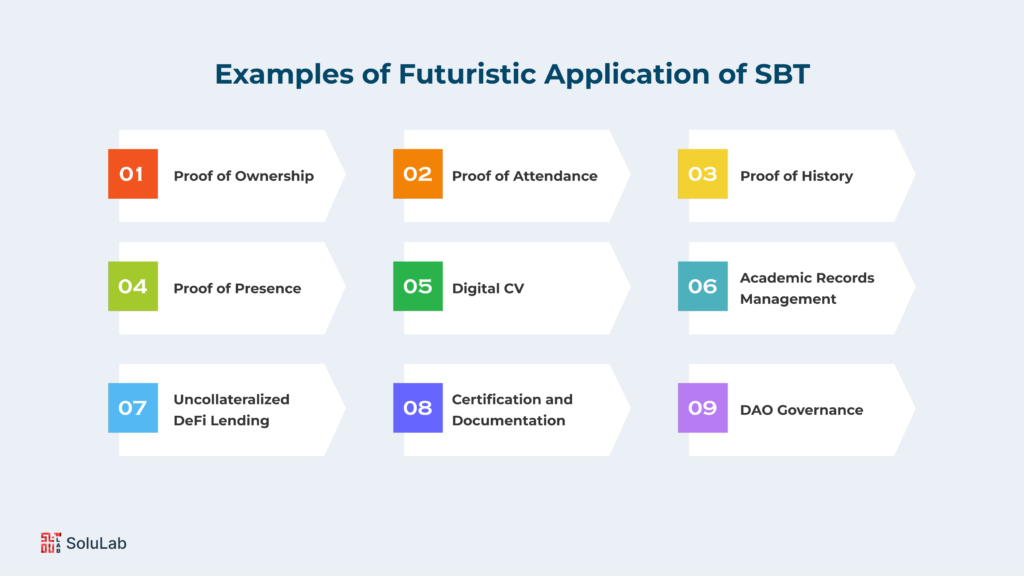
Soulbound tokens serve a versatile range of functions, including but not limited to:
1. Proof of Ownership: Utilize your token to assert your ownership of an item, such as an NFT.
2. Proof of Attendance: Demonstrate your presence at a specific place or event using your tokens.
3. Proof of History: Employ Soulbound tokens to establish the existence of an item at a particular moment in time.
4. Proof of Presence: Verify your attendance at a particular event through Soulsbounded tokens.
5. Digital CV: Construct a digital curriculum vitae by accumulating and showcasing a series of SBTs from various employers. This forms a robust resume, providing a comprehensive employment history.
6. Academic Records Management: Colleges and universities may issue SBTs to their students, simplifying the process of verifying enrollment for future employers. This has the potential to significantly reduce fraud across multiple industries.
7. Uncollateralized DeFi Lending: Explore the option of using your Soulbound tokens as collateral for lending against unsecured assets.
8. Certification and Documentation: Leverage Soulfound tokens to certify documents and offer concrete proof of your existence.
9. DAO Governance: Participate in the governance of DAOs by utilizing your SOUL tokens to vote on proposed initiatives and decisions.
Benefits Of Using Soulbound Tokens
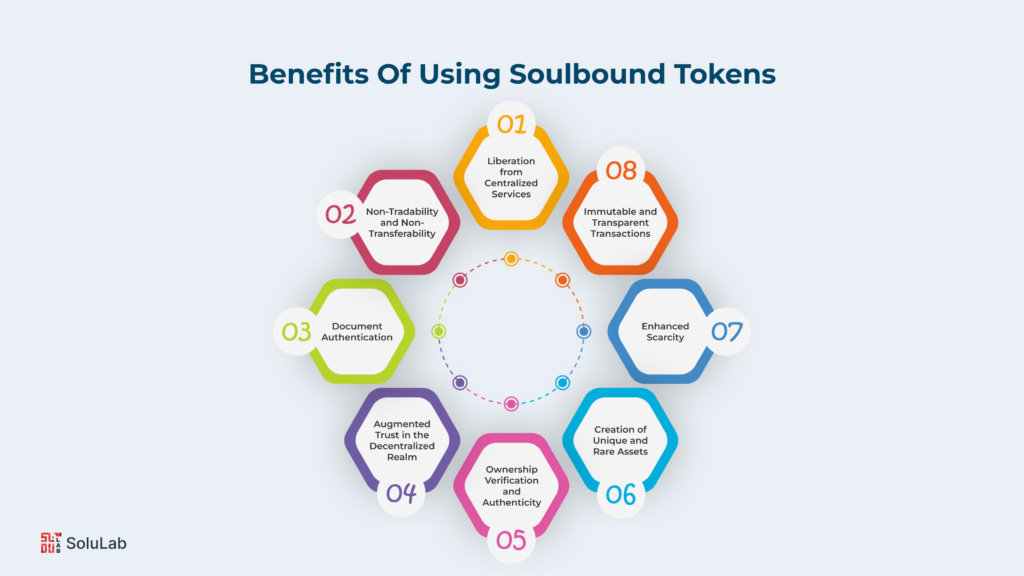
-
Liberation from Centralized Services
In the current landscape, most services are centralized, allowing companies to access and exploit our data for various purposes. With SBTs, individuals regain control over their personal information. Users autonomously manage their data, deciding who has access and for what purposes.
-
Non-Tradability and Non-Transferability
Distinguishing themselves from NFTs, which are easily traded and accumulated, SBTs require effort to obtain. Their true value lies in purposes beyond profit, such as bolstering one’s reputation, enabling access to loans, and participation in specific projects.
-
Document Authentication
Soulbound tokens incorporate digital verification and document storage, benefiting both individuals and institutions. Documents become effortlessly portable, and their authenticity verification process for agencies becomes expedited.
-
Augmented Trust in the Decentralized Realm
SBTs empower members of the decentralized society to assess each other’s reputations, fostering greater trust among peers than what casual interactions on social media or digital projects can offer
-
Ownership Verification and Authenticity
Soulbound tokens offer a robust means of verifying ownership and ensuring the authenticity of digital assets, mitigating the risk of counterfeit or fraudulent tokens.
-
Creation of Unique and Rare Assets
Soulbound tokens enable the creation of one-of-a-kind, rare digital assets, granting collectors and enthusiasts the opportunity to possess exclusive items within the digital realm.
-
Enhanced Scarcity
By limiting the supply of soulbound tokens, they introduce an element of scarcity, potentially increasing their value and appeal among collectors and investors.
-
Immutable and Transparent Transactions
Operating on blockchain technology, soulbond tokens guarantee immutable and transparent transactions, fostering a high level of security and trust among participants.
Limitations Of Soul Bound Tokens
-
Lack of Standardization
The concept of soulbound tokens is still emerging, resulting in a lack of standardization across various platforms and ecosystems. This can lead to fragmentation and interoperability challenges.
-
Limited Use Cases
Currently, soulbond tokens primarily find use in collectibles and digital art, with broader adoption in other industries expected to take time due to the technology’s early stages.
-
Market Volatility
Soulbound tokens can be susceptible to market volatility, leading to price fluctuations and financial risks for investors.
-
Scalability Concerns
As the popularity of soulbound tokens grows, scalability becomes a pressing issue. Blockchain networks may encounter difficulties in handling the increased demand and transaction volume, potentially resulting in performance issues
Soul Bound Token: The Future Of Decentralized Society
Soulbound tokens are still in development and won’t see full-scale adoption until 2024. Nevertheless, their potential impact on a decentralized society is immense, with countless yet-to-be-imagined applications. While practical uses like streamlining the hiring process, simplifying mortgage applications, and enhancing medical records management are already in progress, the possibilities for SBTs in mainstream society are boundless.
Soulbound tokens play a pivotal role in supporting a decentralized society by facilitating efficient data management and ensuring the accurate transfer of information. Moreover, they hold the promise of promoting fair social scoring systems, mitigating discrimination, and preventing abuses. Shortly, we might see SBTs being used to assist individuals in college applications, contractor selection, job candidate evaluation, charity organization selection for donations, and much more.
In a Web 3.0 society, individuals gain direct control over their data, enabling swift and precise data exchange. As soulbound token technology continues to evolve and becomes commonplace, it will lead to enhancements in privacy, speed, equality, and various other aspects of our digital lives.”
1. Proto-Soulbound NFTs: These NFTs can create and manage SBTs, issuing or revoking them to other wallets as needed.
2. Multisig Community Wallets: These wallets can issue SBTs to community members and also can revoke or recover them if they are lost.
3. Proto-Souls and Proto-Wallets: SBTs can be issued directly to other Souls or wallets.
4. Whitelist Passes: NTSTs can be offered as whitelist passes to community members who actively contribute to a project and its community.
5. Identity Documents: SBTs can serve as digital citizenship passes or identity documents, such as driving licenses, passports, and voter IDs.
6. Defi Lending: SBTs can revolutionize decentralized finance (DeFi) lending
7. Social-Credit Score: DeFi protocols can issue loans based on Soul’s real-time relationships across different communities, replacing the need for upfront collateral with a reputation in the form of SBTs.
8. Soulbound NFTs: These non-transferable non-fungible tokens (NFTs) or non-transferable social tokens (NTSTs) are gaining attention, with Vitalik suggesting their importance in the Metaverse. They can be awarded as achievements for completing specific tasks, similar to how Guinness World Records recognizes achievements.
9. Loan Representation: Loans and credit lines can be represented as non-transferable but revocable SBTs, simplifying the lending process.
Take Away
In conclusion, Soulbound tokens represent an innovative and adaptable breakthrough in blockchain technology. With their inherent security features, interoperability, and possible uses in a variety of industries, they provide unparalleled prospects for developers, organizations, and people. Soulbound tokens have the potential to alter how we interact with and safeguard digital assets in the decentralized ecosystem, ranging from improving digital asset ownership to reinventing supply chain management and beyond. As we continue to explore the depths of blockchain innovation, Soulbound tokens serve as a light of hope, bringing in a new era of trust, transparency, and empowerment in the age of digital technology.
With a rich legacy spanning more than 15 years in software, blockchain, and web3 development, SoluLab emerges as a revered authority in the software development industry. Leveraging our deep expertise and proficiency, we stand as a trusted name synonymous with excellence.
At SoluLab, our developers boast extensive knowledge and mastery in a spectrum of web3 development services, including advanced soulbound token development solutions. Our tailored solutions cater to diverse needs, ensuring robustness, security, and scalability. Partner with SoluLab today to tap into the full potential of Soulbound tokens. Contact us now!
FAQs
1. What are Soulbound Tokens?
Soulbound tokens are digital assets that are uniquely tied to a specific user or account within a blockchain network. These tokens cannot be transferred, traded, or accessed by any other entity, ensuring the utmost security and ownership over digital assets.
2. How are Soulbound Tokens Different from Traditional Tokens?
Unlike traditional tokens, which can be freely traded or transferred between users, Soulbound tokens are permanently bound to a specific user or account. This unique feature enhances security and prevents unauthorized access or transfer of digital assets.
3. What Are Some Common Use Cases for Soulbound Tokens?
Soulbound tokens have a wide range of potential applications across various industries. Common use cases include digital asset ownership, secure authentication and access control, supply chain tracking, digital identity management, and more.
4. How Can SoluLab Assist in Soulbound Token Development?
SoluLab offers comprehensive soulbound token development services, leveraging over 15 years of experience in software and blockchain development. Our team of experts specializes in creating robust, secure, and scalable soulbound token solutions tailored to meet the unique needs of businesses and individuals.
5. Are Soulbound Tokens Compatible with Existing Blockchain Networks?
Yes, soulbound tokens can be designed to be compatible with existing blockchain networks such as Ethereum, Binance Smart Chain, and others. This interoperability enables seamless integration of soulbound token solutions into existing blockchain ecosystems, enhancing their versatility and usability.


